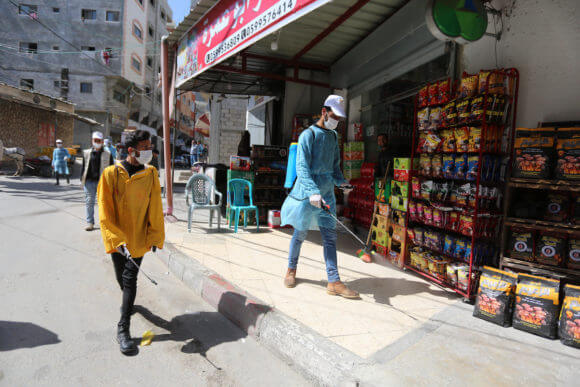This is the latest edition of our special coverage newsletter on the COVID-19 crisis in Palestine featuring dispatches directly from our Palestine correspondent Yumna Patel on the ground in Bethlehem. This newsletter is published Tuesdays and Fridays.
Today marks exactly two months since the first cases of the coronavirus were detected in Bethlehem, and a state of emergency was declared in Palestine.
For the past 10 days or so, we’ve seen a shocking return to life before COVID-19. While places of worship, schools, and universities have remained closed, shops have started to open back up, and the streets are filled with people again.
But just days after announcing their plans to reopen the economy, the Palestinian Authority announced on Tuesday an extension of the state of emergency, due to the fact that the outbreak “is not yet under full control.”
The reality that things are not under control is blatantly obvious to the average citizen walking through the streets of Bethlehem, Ramallah, Nablus, or any of the major cities in the West Bank. Markets are crowded, people are going about their shopping as normal, and there’s not a mask in sight.
It was only two weeks ago that new cases were being reported, yet today, police checkpoints are unmanned, and the so-called nightly curfew has barely been enforced.
Everyone I speak to is frustrated; frustrated with the government’s inability to seemingly make a decision and stick to it, frustrated by the state of financial and economic despair being faced by most of the country, and frustrated by the fact that there is no clear direction on what we should be doing.
Many private companies such as hotels and restaurants have not followed through on their agreements to pay workers even a portion of their salaries. Applications for financial aid for private sector workers were sent out weeks ago, but no one has seen any subsidies come their way.
People who have no experience in construction are trying to enter Israel illegally, just to find any menial labor they can in order to make some cash for themselves and their families.
People seem to have reached their breaking point.
The mentality, for many, is as follows: the government clearly doesn’t seem concerned about the threat, so why should we continue to suffer under quarantine?
On Sunday, fights broke out in the streets of Hebron city between Palestinian police and shopkeepers, allegedly over attempts by police to shut down stores and enforce social distancing.
A day later, on Monday, eight new cases of the virus were confirmed in the Hebron district.
Studies have indicated that COVID-19 in Palestine will peak near the end of May, in about two weeks time. Given the reality on the ground, I wouldn’t be surprised if that turns out to be true, with our numbers soaring into the thousands.
The current moment seems like the point of no return for Palestinians in the West Bank.
Either the government decides to tighten up restrictions again, and force people into quarantine for another month, or we continue down the path we’re on and wait to see what comes our way. Either way, whether financially or with their health, people are going to hurt.



A message from Samia Khoury, matriarch of Jerusalem’s eminent Khoury family:
The Corona Lockdown, May 5/20
“As the discussion continues on easing the Lockdown that has paralyzed the world, I could not but reflect on a quotation by one of the Palestinian refugees the day she arrived in Birzeit in 1948. The Palestinians from Ramleh and Lydda were evicted by the Israeli army in the hot month of July 1948 and forced to walk for two days before they found refuge in Birzeit and Ramallah.
“Many books were written about this part of the Palestinian catastrophe, and I alluded to it in my book – ‘Reflections from Palestine: A Journey of Hope’, Prof Reja-e Busailah describes that walk meticulously and so vividly in his book ‘In the Land of My Birth’ when at the age of 19, he joined the people of Lydda in the exodus march.
“As we continued to listen to the various personal stories of a number of those exhausted refugees, one lady was ever so grateful that she arrived alive, realizing the great loss of life that took place on that journey and among those who stayed behind. Referring to what she had left behind, she said: ‘Property cannot bring back life, but life can bring back material belongings.’ Indeed, many of the Palestinians who survived that Nakba get credit for the development of many Arab countries as well as a number of institutions in other parts of the world.
“When the Corona Pandemic invaded the world one of the earliest governments to take action on a lockdown was that of Palestine. It was a wise decision because a country under occupation with limited resources and access to facilities could not afford the luxury of procrastination. Ironically, the most developed countries, including the U.S., were late to react and the resulting loss of life says a lot.
“However, after a two-month lockdown it is not surprising that business people are starting to worry and the pressure to return to normal life has already started.”